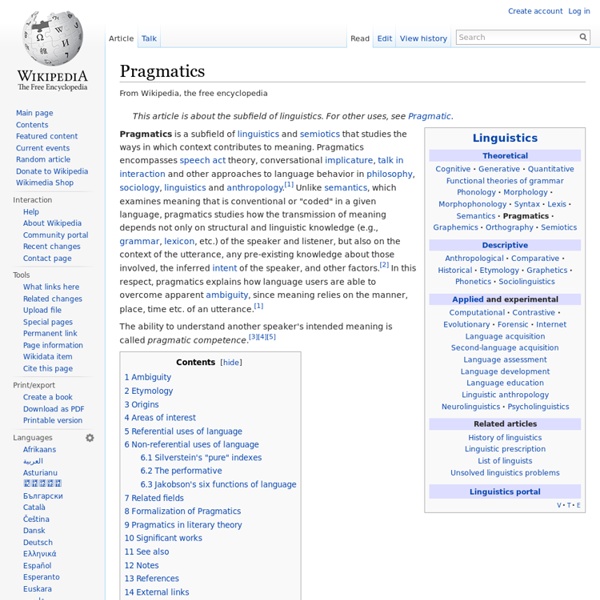Pragmatics

Ambiguity
Ambiguity is an attribute of any concept, idea, statement or claim whose meaning, intention or interpretation cannot be definitively resolved according to a rule or process consisting of a finite number of steps. The concept of ambiguity is generally contrasted with vagueness. In ambiguity, specific and distinct interpretations are permitted (although some may not be immediately apparent), whereas with information that is vague, it is difficult to form any interpretation at the desired level of specificity. Context may play a role in resolving ambiguity. Linguistic forms[edit] Structural analysis of an ambiguous Spanish sentence: 'Pepe vio a Pablo enfurecido Interpretation 1: When Pepe was angry, then he saw Pablo Interpretation 2: Pepe saw that Pablo was angry. The context in which an ambiguous word is used often makes it evident which of the meanings is intended. More problematic are words whose senses express closely related concepts. For example, "You could do with a new automobile.
Semantics
Montague grammar[edit] In the late 1960s, Richard Montague proposed a system for defining semantic entries in the lexicon in terms of the lambda calculus. In these terms, the syntactic parse of the sentence John ate every bagel would consist of a subject (John) and a predicate (ate every bagel); Montague demonstrated that the meaning of the sentence altogether could be decomposed into the meanings of its parts and in relatively few rules of combination. Despite its elegance, Montague grammar was limited by the context-dependent variability in word sense, and led to several attempts at incorporating context, such as: Situation semantics (1980s): truth-values are incomplete, they get assigned based on contextGenerative lexicon (1990s): categories (types) are incomplete, and get assigned based on context Dynamic turn in semantics[edit] In Chomskyan linguistics there was no mechanism for the learning of semantic relations, and the nativist view considered all semantic notions as inborn.
Nominalization
Nominalization in various languages[edit] English[edit] From the viewpoint of linguistic prescriptivism, nominalizations are considered to make sentences more difficult to follow and to promote wordiness. For these reasons, nominalizations are usually discouraged in writing. With derivational morphology[edit] This is a process by which a grammatical expression is turned into a noun phrase. Examples of nouns formed from adjectives: applicability (from applicable)carelessness (from careless)difficulty (from difficult)intensity (from intense) Examples of nouns formed from verbs: failure (from fail)nominalization (from nominalize)investigation (from investigate)movement (from move)reaction (from react)refusal (from refuse) An especially common case of verbs being used as nouns is the addition of the suffix -ing, known in English as a gerund. swimming (from swim)running (from run)editing (from edit) With zero-derivation[edit] change I need a change. murder The murder of the man was tragic. progress use
Related:
Related:



